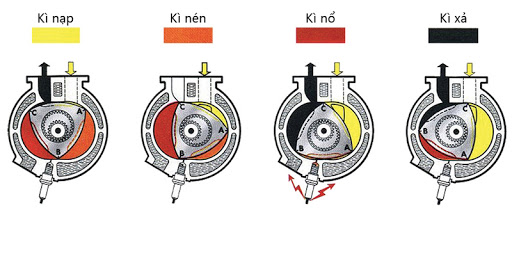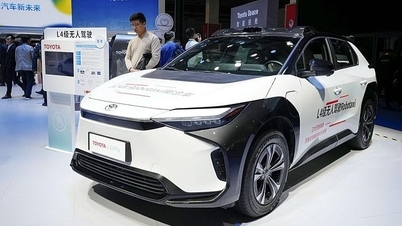Mazda's one-time pride
The Wankel rotary engine is a type of air-fueled internal combustion engine invented by Felix Wankel in the 1920s and developed and manufactured by the Japanese automaker Mazda.
This engine differs from a conventional internal combustion engine in that it does not use pistons and cylinders, but instead uses a three-dimensional rotor rotating around an axis.

Cars using Wankel engines were once the pride of Mazda.
With many advantages over today's popular engines such as power ratio, superior weight, smooth operation, cheaper production cost, Wankel engines once had the ambition to replace traditional engines in popular car models.
The RX-7 series was developed by Mazda with 3 generations. The last generation was developed in the years 1992-2002.
To this day, no commercial vehicle has been produced with a Wankel engine due to strict emission standards. This makes Mazda's RX-7 rare and sought after by many car enthusiasts.
Why did the Wankel engine gradually fade into oblivion?
Although it has many advantages over traditional engines, the Wankel engine also has major disadvantages that cannot be overcome, causing this engine block to gradually sink into oblivion.
Low thermal efficiency and fuel waste are major disadvantages of Wankel engines, because the combustion chamber in Wankel rotary engines is designed in an elongated oval shape, thermal efficiency is significantly reduced compared to engines using piston and cylinder mechanisms.
This also often results in unburned fuel being expelled from the exhaust. And when this fuel mixture burns, it creates a backfire. This not only wastes fuel but can also damage the exhaust system, due to the high temperature and pressure.

Wankel engine operating cycle.
Because the Wankel engine's combustion chamber is designed to be long, thin and always moving, it takes a long time for the rotor to complete a cycle.
Furthermore, the large temperature difference between the rotor parts leads to different thermal expansion. The efficiency and life of the rotor are also affected. In fact, an AC motor has a life span of only about 2/3 of a conventional motor.
Emissions are a major factor that makes it difficult for the Wankel engine to develop. In today's complex environmental situation, it is understandable that a car model with a Wankel rotary engine cannot pass a strict emission test like in Europe (the Mazda RX-8 has been banned from sale in Europe since 2010 for this reason, and its sales have dropped significantly).
Due to the simple structure of the rotary engine, it is inevitable that engine oil will leak during operation, as well as unburned fuel escaping into the exhaust pipe, which makes the vehicle have a fairly high emission index and is not environmentally friendly.
Source: https://xe.baogiaothong.vn/dong-co-dac-biet-tren-chiec-xe-hang-hiem-mazda-rx-7-192240330091011997.htm


![[Photo] Prime Minister Pham Minh Chinh chairs meeting to review preparations for trade negotiations with the United States](https://vphoto.vietnam.vn/thumb/1200x675/vietnam/resource/IMAGE/2025/5/6/1edc3a9bab5e48db95318758f019b99b)


![[Photo] Prime Minister Pham Minh Chinh chairs the regular Government meeting in April 2025](https://vphoto.vietnam.vn/thumb/1200x675/vietnam/resource/IMAGE/2025/5/6/48eb0c5318914cc49ff858e81c924e65)
![[Photo] Prime Minister Pham Minh Chinh receives Mr. Tomas Heidar, Chief Justice of the International Tribunal for the Law of the Sea (ITLOS)](https://vphoto.vietnam.vn/thumb/1200x675/vietnam/resource/IMAGE/2025/5/6/58ba7a6773444e17bd987187397e4a1b)

































































































Comment (0)